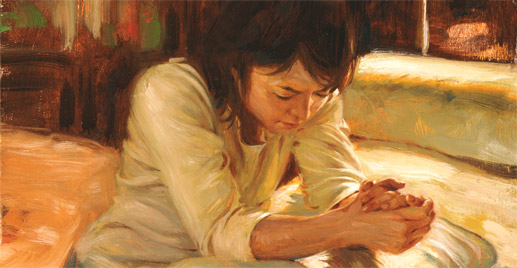
A few thoughts have been going around in my head recently. First, is the concern I’ve seen from sisters that there isn’t more of a feeling of unity within their Relief Societies. Second, hearing comments about Pres. and Sis. Oaks’ recent counsel to young marrieds in Chicago. Third, I’ve started reading Daughters in My Kingdom, and while reviewing the history of our Relief Society, I’m being reminded of certain clarifying thoughts and feelings.
Creating a Feeling of Unity in Relief Society
We talk about “being vulnerable” in our council meetings and it generally has the opposite effect than intended. Maybe that’s why it wasn’t hard to give up on the council meetings. What exactly is “being vulnerable” anyway?
I used to think it was sharing personal feelings. But I have come to learn that being vulnerable (as the world terms it) is admitting openly to doubts about faith, ability to cope, failings, and other depressing areas. Any discussion that comes from vulnerable-speak will not end in a positive way. It can’t. Being vulnerable (as the world terms it) will never invite the spirit to heal, uplift, or testify of a better way.
By focusing on worldly attitudes, the Spirit will not come and help us unite in the gospel.
“Research Is Not the Answer”
Speaking of losing faith, Pres. Oaks testified that “research is not the answer.” More and more people are turning to the Internet to find their answers, but guess what they find? They find anti-Mormon blogs, disgruntled inactive members who are “being vulnerable,” and people who have already lost their faith.
Logically, we need to recognize where we’re going to find the right answers. If we have questions about our faith, isn’t it best to go to the source? The scriptures give countless examples of people without faith finding their faith. Another source is praying to our Heavenly Father. And I believe He wants to hear from us in our most vulnerable state.
Have you noticed that those who struggle with their testimonies have stopped praying and reading their scriptures regularly?
Re-reading Daughters in My Kingdom
Being a real advocate of knowing our history in order to navigate our purpose and destiny, I decided to re-read this book. I’ve invited a few friends to study with me, so we can share our thoughts and feelings. Using the original meaning, I suppose we are showing our vulnerability, our desire to meet with the Spirit in order to be truly strengthened in this difficult world. And I believe this faithful exercise is likely to bring unity between us.
When Joseph learned that a group of women wanted to form a formal charitable society, he said that it was a good idea, but “this is not what you want. Tell the sisters their offering is accepted of the Lord, and he has something better for them” (pg. 12).
Interesting that he acknowledges that the world cannot give them what they really want. But the Lord can.
A Spiritual Purpose
Emma Smith stood before this newly formed sisterhood and declared, “We are going to do something extraordinary” (pg. 14). On what basis could she make that declaration? Joseph Smith taught the women, in those early meetings, “This society is to get instruction through the order which God has established” (pg. 14). With the power of the priesthood sustaining us, the Relief Society is capable of an extraordinary purpose. Our purpose has been worded in many different ways, but I personally like how Emmeline B. Wells states it,
“We do declare it our purpose to keep intact the original name and initial spirit and purpose of this great organization, holding fast to the inspired teachings of the Prophet Joseph Smith when he revealed the plan by which women were to be empowered through the calling of the priesthood to be grouped into suitable organizations for the purpose of ministering to the sick, assisting the needy, comforting the aged, warning the unwary, and succoring the orphans” (pg. 63).
With this kind of attitude, that long-ago circle of sisters had unity. In their meetings, they talked about who amongst them needed help, and how they would deliver that help. There was no talk of vulnerability or doubt, only faith, love, and a desire to live by the spirit.
Are we capable of having these same feelings? Where do we search for answers? Who do we turn to in our struggling? What will be our expected outcome?
Seeking Spiritual Enlightenment
Another quote from Emmeline B. Wells gives us more to think upon.
“We are getting too far away from the spiritual side of our great work, and from the thought that inspired the first organization of the Relief Society. The Society stands first for spirituality, and then for charity and mercy.” (Emmeline B. Wells, quoted in Women of Covenant by Derr, Cannon, Beecher. Pg. 189)
Our church encourages its members to question, but in that questioning must come a desire for spiritual answers and resolution, not worldly solutions that tend to cause conflict and unrest. This is a gospel of peace and there are answers readily available to all true seekers that will come seeking the spirit.
We must be on the same “wave-length” because I felt impressed to re-read Daughter in My Kingdom also! Thank you for sharing your thoughts so clearly. I don’t know of anyone who actually attends church, out here in the boonies, who is having a faith crisis, or questions or such, those kind of people just stop attending church, and some of them have been gone for decades, but their names are still on the records. Anyway, you are correct that we have a lot of work to do to promote unity and put into practice our RS purposes! Keep up the good work!